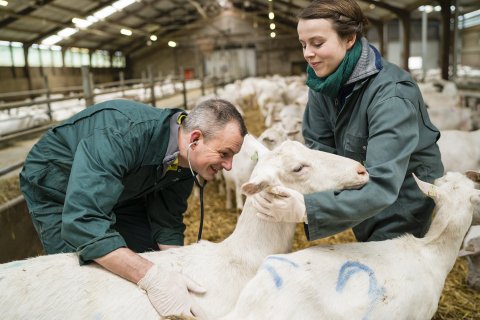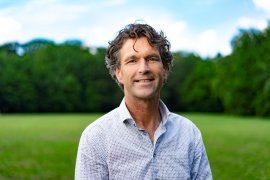Planetary Health

We live together with the food we eat, the animals we keep and the millions of microbes that inhabit out guts, soils and the very air we breathe. Healthy organisms require a healthy planet. Our definition of health goes beyond human disease and looks at the entire system we live in. From a one-health perspective we combine our strong expertise in veterinary medicine with that of our excellent human medical research, for instance to investigate how humans and animals live together and how diseases spread from animals to humans and back (zoonosis), investigating potential pandemics.
Keeping our planet liveable requires a perspectve to health that goes beyond human disease. Our strong expertise in veterinary medicine, combined with excellent human medical research and fundamental life sciences creates fertile soil for innovation. With a strong focus on prevention, we fight causes rather than symptoms.
Planetary Health
Our health largely depends on the health of all the ecosystems we rely on. This realization, which is becoming increasingly urgent in light of the current environmental crisis, calls for research with a broad perspective. Under the umbrella of the thematic community of planetary health, various strong Utrecht research themes come together to address global issues in sustainable health. We spoke with Professor Roel Vermeulen and Professor George Kowalchuk, chair and vice-chair of the new community. Vermeulen leads the Utrecht research into Environmental Epidemiology and Exposome analysis, while Kowalchuk directs the research on ecology and biodiversity.
Planetary Health board
Board members play an active role in facilitating strategic positioning and visibility of the community. Selected from a cross-section of the community, they are positioned to bring talented people together and to stimulate multidisciplinary research that help to strengthen the community.
Exposome
We are forerunners in the rapidly growing field of the exposome: the collective name for environmental influences on health. Gathering huge datasets to map and better understand population health. At the fundamental level, we investigate the life and health of plants, to better understand climate and disease resilience and to ensure healthy crops for future generation. Using modern plant biology in combination with Artificial Intelligence (AI) we are learning to harness the resilience of plants. Better understanding health allows us to stay healthy and prevent disease, fighting the causes rather than the symptoms.
One Health Perspective

There are 88 countries with a population of more than 10 million. Of those, The Netherlands is the 5th smallest in land mass, ranks 4th in highest in density population, and is the world’s 2nd greatest exporter of food and agricultural products. Integrating environment and human and animal health under the One Health programme is a top priority.
Integrated approach
Many microbes infect both humans and animals and share the same ecosystems, creating a circular transfer of disease-causing agents. Well-known outbreaks, such as Ebola, influenza (flu), and Zika virus are examples of how closely interconnected we are with our environment. One Health emphasises the connections between these sectors, and calls for a sustained, integrated approach in order to improve health conditions and health care across the globe.
We're connecting humans, animals and the environment
Given the intimate relationship between animal and human health and the environment, the joint research programmes of the Faculty of Veterinary Medicine, the Faculty of Science and UMC Utrecht constitute a unique centre of excellence for One Health. In collaboration with our public and private partners, we focus on the prevention of and fight against existing and emerging infectious diseases – both in humans and animals – including zoonoses and food safety pathogens, on the prevention and control of antimicrobial resistance and on overcoming environmental risks.
National alliance
The Netherlands Centre for One Health (NCOH) is a national alliance initiated by Utrecht University and launched in 2016. Within the NCOH we aim to find solutions to Global One Health Challenges, such as outbreaks of emerging infectious diseases and antimicrobial resistance. As the causes and possible solutions also include components of healthy farming and healthy wildlife and ecosystems, a One Health approach is required to solve these major societal challenges.












